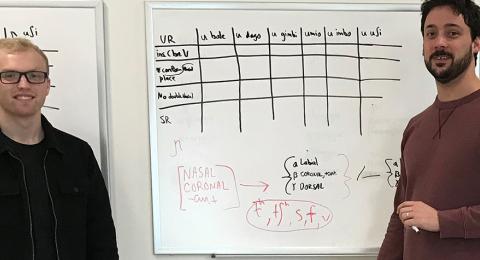What is linguistics?
Linguistics is the study of language. What are the characteristics that all languages share and what makes each language distinctive? How does language vary according to region, social class, ethnicity and gender? In the linguistics minor, you’ll be introduced to the properties common to all human languages along with language history, function and acquisition. A linguistics minor can be combined with studies in many other fields, including anthropology, psychology,sociology, speech therapy and computer science.
Why study linguistics at UNH?
The linguistics minor at UNH provides a solid introduction to the field while also preparing you for further studies in areas such as law, speech or hearing science, or language. It’s a great fit if you’re interested in teaching English as a foreign language at home or abroad. You’ll have the opportunity to participate in an internship and take advantage of a variety of study abroad programs.
Potential careers
- Analyst
- Editor
- English as a second language teacher
- Interpreter
- Knowledge engineer
- Lexicographer
- Speech pathologist
- Translator
Students interested in the minor should contact Professor Burdin (Rachel.burdin@unh.edu).
Curriculum & Requirements
Linguistics is the study of one of the most important characteristics of human beings—language. It cuts across the boundaries between the sciences and the humanities. Students interested in the minor should consult with Prof. Rachel Burdin, rachel.burdin@unh.edu, (603) 862-1088 the program coordinator, or with any professor who teaches linguistics courses.
Academic policies related to Minors.
| Code | Title | Credits |
|---|---|---|
| Required Course | ||
| ENGL 405 | Introduction to Linguistics | 4 |
| or LING 405 | Introduction to Linguistics | |
| Electives | ||
| Select four (4) courses from the following: | 16 | |
CMN 666 | Conversation Analysis | |
ENGL 603 | Phonetics | |
ENGL 604 | Phonology | |
ENGL 605 | Intermediate Linguistic Analysis | |
ENGL 606 | Languages of the World | |
ENGL 607 | Syntax | |
ENGL 608 | Semantics | |
ENGL 715 | Teaching English as a Second Language: Theory and Methods | |
ENGL 716 | Curriculum, Materials and Assessment in English as a Second Language | |
ENGL 718 | Morphology | |
ENGL 719 | Sociolinguistics Survey | |
ENGL 727 | Issues in Second Language and Multilingual Literacy | |
ENGL 728 | Language and Gender | |
ENGL 752 | History of the English Language | |
ENGL 779 | Linguistic Field Methods | |
ENGL 790 | Special Topics in Linguistics | |
ENGL 791 | English Grammar | |
ENGL 793 | Phonetics and Phonology | |
ENGL 794 | Syntax | |
LING 603 | Phonetics | |
LING 604 | Phonology | |
LING 605 | Intermediate Linguistic Analysis | |
LING 606 | Languages of the World | |
LING 607 | Syntax | |
LING 608 | Semantics | |
LING 718 | Morphology | |
LING 719 | Sociolinguistics Survey | |
LING 728 | Language and Gender | |
LING 779 | Linguistic Field Methods | |
LING 790 | Special Topics in Linguistics Theory | |
LING 793 | Phonetics and Phonology | |
LING 794 | Syntax | |
LLC 791 | Methods of Foreign Language Teaching | |
PSYC 512 | Psychology of Primates | |
PSYC 513 | Cognitive Psychology | |
PSYC 712W | Psychology of Language | |
RUSS 733 | History of Slavic Languages and Culture | |
SPAN 641 | Spanish Language Variation & Change | |
SPAN 645 | Intro to Spanish Linguistics | |
| Total Credits | 20 | |





